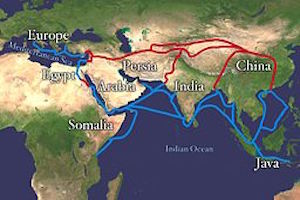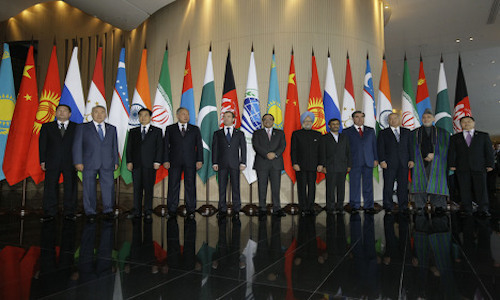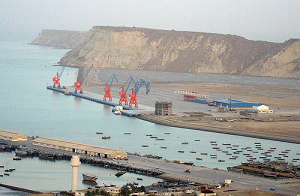The Belt and Road Initiative and China's Xinjiang Dilemma: “Connectivity” Versus Control?
By Michael Clarke
July 20, 2017, the CACI Analyst
President Xi Jinping’s ambitious “Belt and Road Initiative” (BRI) seeks to make China the hub of trans-Eurasian economic connectivity by linking the Chinese economy with the major continental and maritime zones of the Eurasian continent through both physical and financial infrastructure. President Xi has proclaimed that BRI will “benefit people across the whole world” as it will be based on the “Silk Road spirit” of “peace and cooperation, openness and inclusiveness”. This rhetoric may be enhancing Beijing’s diplomatic position but it is one that rings hollow in China’s own Eurasian frontiers such as Xinjiang where BRI is coinciding with the imposition of new forms of political and social control.

India’s and Pakistan’s Memberships Diminishes SCO’s Ability to Compete with NATO
By Naveed Ahmad
July 18, 2017, the CACI Analyst
The Shanghai Cooperation Organization (SCO) summit admitted India and Pakistan as full members on June 9; and now represents 40 percent of the human population and 20 percent of the global GDP. Russia and China have traditionally used the forum to promote a collective approach to countering NATO policies and advances. Though originally instituted to address separatism, terrorism and drug trafficking, the admission of India and Pakistan may drastically change the character of the grouping. China and Pakistan differ with India on key issues that the SCO aims to achieve. The trio has bitter geographical disputes while differing over the definition of terrorism. Against this backdrop, what kind of challenge can the SCO pose to NATO?

The China-Pakistan Economic Corridor Between Hope and Fear
By Mushtaq A. Kaw
April 26, 2017, the CACI Analyst
In December 2016, China’s Ambassador to Pakistan, Zhao Lijian, stated that “CPEC is working well” with the support of the Pakistani people, notwithstanding certain opposition. The statement is characteristic of China’s and Pakistan’s praise for the China-Pakistan Economic Corridor (CPEC) as a game changer for their respective economies and regional connectivity. Yet in reality, the project faces a variety of intricate economic challenges as well as security threats. Its success will therefore depend upon an inclusive, balanced and sustained China-Pakistan approach towards the forces hostile to the project. Even then, the project will have various geopolitical, geo-economic and geo-strategic implications for the region and the world.

The curious case of Chinese troops on Afghan soil
By Franz J. Marty
February 3, 2017, the CACI Analyst
Overwhelming evidence – photographs, an eyewitness account and several confirming statements of diplomats and observers, among them a Chinese official familiar with the matter – leaves virtually no doubt that Chinese troops have undertaken joint patrols with their Afghan (and possibly also Tajik) counterparts on Afghan soil in the Little Pamir, a high plateau near the Afghan-Chinese border. While the Chinese source insists that such joint border patrols were based on an agreement, and therefore legal, the Afghan government steadfastly denies the existence of such patrols.
EU–China trade to bolster security in the South Caucasus
By Boris Ajeganov
January 23, 2017, the CACI Analyst
Foreign investment in Georgia is strengthening the country’s importance in connecting East Asia with Europe, which has positive implications for the broader region. The rise in FDI in commercial and transportation infrastructure in combination with the signing of international free trade agreements will reduce Georgia’s vulnerability in terms of economic and, ultimately, ‘hard’ security. The growing importance of the South Caucasus as node for EU-China trade will weaken Russia’s incentives to undermine its southern neighbors by military, political, and economic means as it has done in the past. Accordingly, Tbilisi’s ability to conduct an independent foreign policy is set to improve despite the absence of Western security guarantees.








 Book S. Frederick Starr and Svante E. Cornell,
Book S. Frederick Starr and Svante E. Cornell,